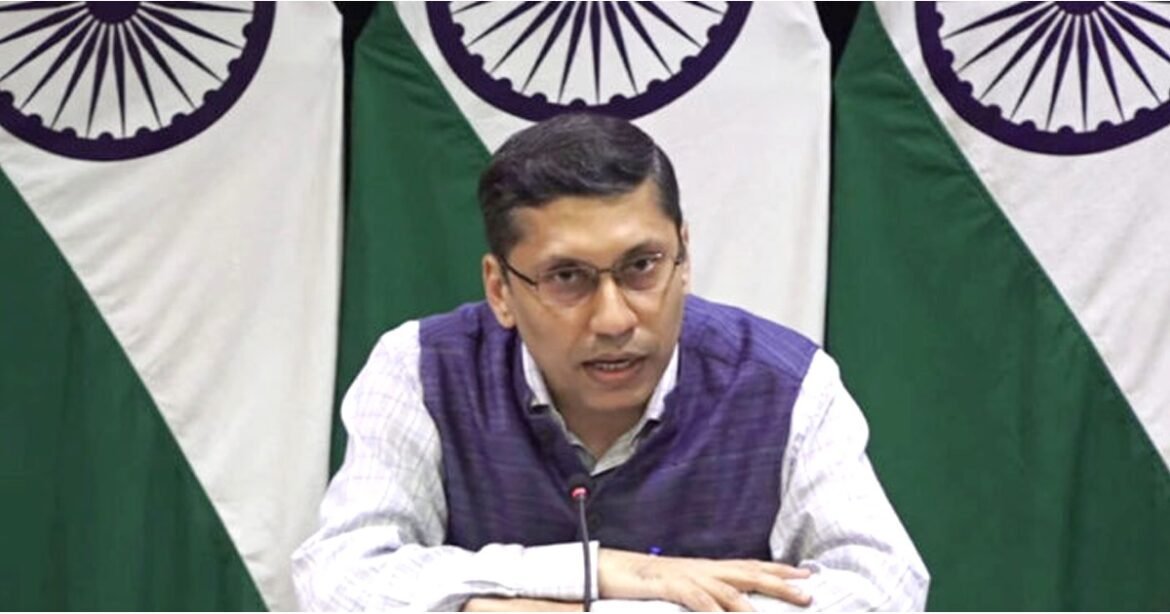India has affirmed that election and the democratic process in Bangladesh have to be determined as per how people of the country choose to do so.
In regards to the upcoming national elections in Bangladesh, India has taken a clear position of non-interference. Arindam Bagchi, the spokesman for the Indian Ministry of External Affairs, stated on Thursday that the elections would be conducted peacefully, leaving the decision-making power in the hands of the Bangladeshi people.
You can also read: Bangladesh and India Embrace New Economic Initiatives Amidst Growing Challenges
While the BNP’s demand for an election-time caretaker government was not directly addressed, Bagchi’s remarks underscore India’s commitment to respecting Bangladesh’s sovereignty and upholding democratic principles. The focus remains on empowering the citizens of Bangladesh to exercise their democratic rights through a transparent and inclusive electoral process, enabling them to shape the future of their nation
India expresses optimism for fair and peaceful election but has no comment on caretaker government
The Indian spokesperson was questioned about India’s perspective on the international community’s remarks and suggestions regarding Bangladesh’s upcoming elections, as a number of nations have expressed various opinions about the upcoming election. He replied, “The whole world may comment on it but India is India and we have a very special relationship with Bangladesh.”
The ministry of external affairs spokesperson said what happens in Bangladesh impacts them.
“Look, I think there are multiple activities going on, people are perhaps commenting on it,” Bagchi said.
“Of course, India is closely monitoring the situation, and mentioned that they have a high commission in Dhaka. We hope that there is peace and no violence, and the elections are held as per plans,” said the spokesperson.
He, however, refrained from making any remark on the election under a caretaker government. On the issue of caretaker government, he said, “I certainly don’t have any comment on it.”
The main opposition is also active about the election and participating in meetings with different delegation teams. Long after, the Indian high commissioner in Bangladesh met with the main opposition BNP. After the meeting, BNP leaders expressed their desire for the formation of a caretaker government prior to the election.
Nevertheless, the spokesperson declined to comment on the BNP leaders’ statement regarding the interim government. He also did not speak on the meeting between BNP leaders and the Indian high commissioner.
Why caretaker government has no priority among international community?
This was India’s first official statement regarding the current situation in Bangladesh, focusing on the impending national election. New Delhi’s remarks are made against the backdrop of an ongoing political impasse, in which the ruling Awami League supports the constitution in holding upcoming election, while the opposition BNP is adamant that the current government must resign and form a caretaker government.
The Western world are also advocating for a fair and unbiased election in Bangladesh. The United Nations emphasizes inclusive and tranquil elections. The Bangladeshi government asserts that it is also devoted to holding free, fair, and peaceful elections.
Nevertheless, no international community has commented on the interim government during the election period.
Recent analyses of foreign diplomats and representatives indicate that none of them have supported an interim government. The delegation teams from the United States and the European Union, who recently monitored the election process in Bangladesh, have also expressed optimism regarding a fair election process without the need for a provisional government. Instead, they have endorsed a constitutionally compliant election that is equitable, peaceful, and acceptable. They have not stated that Bangladesh’s current Election Commission is incapable of conducting a fair voting process, proving that the current government is on the right path to hold fair elections.
However, the main opposition has been persistent about holding elections under interim rule. In reality, however, there is no such thing as a caretaker government in the world’s current democratic systems.
Moreover, decisions regarding the election process of a democratic nation are indeed an internal matter, as they are made by the nation’s citizens. China and Russia have stated that Bangladesh’s election process is an internal matter. While China has stated that it will assist Bangladesh in preserving its sovereignty and independence, Russia has asserted that the manner in which elections are conducted and organized in Bangladesh is governed by national law.
Lastly, as Bangladesh prepares for its upcoming national elections, the global community including India, is steadfast in its commitment to upholding a peaceful, transparent, and democratic process while adhering to the principles of non-intervention in a nation’s internal affairs.


